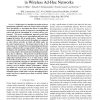Free Online Productivity Tools
i2Speak
i2Symbol
i2OCR
iTex2Img
iWeb2Print
iWeb2Shot
i2Type
iPdf2Split
iPdf2Merge
i2Bopomofo
i2Arabic
i2Style
i2Image
i2PDF
iLatex2Rtf
Sci2ools
152
click to vote
ICC
2000
IEEE
2000
IEEE
Power Management for Throughput Enhancement in Wireless Ad-Hoc Networks
—In this paper we introduce the notion of power management within the context of wireless ad-hoc networks. More specifically, we investigate the effects of using different transmit powers on the average power consumption and end-to-end network throughput in a wireless ad-hoc environment. This power management approach would help in reducing the system power consumption and hence prolonging the battery life of mobile nodes. Furthermore, it improves the end-to-end network throughput as compared to other ad-hoc networks in which all mobile nodes use the same transmit power. The improvement is due to the achievement of a tradeoff between minimizing interference ranges, reduction in the average number of hops to reach a destination, the probability of having isolated clusters, and the average number of transmissions (including retransmissions due to collisions). The protocols would first dynamically determine an optimal connectivity range wherein they adapt their transmit powers so as t...
Related Content
| Added | 31 Jul 2010 |
| Updated | 31 Jul 2010 |
| Type | Conference |
| Year | 2000 |
| Where | ICC |
| Authors | Tamer A. ElBatt, Srikanth V. Krishnamurthy, Dennis Connors, Son K. Dao |
Comments (0)

